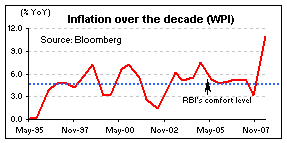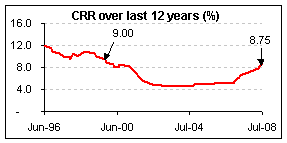At a time when your monthly food and fuel budget is already pressurising your pockets, the home loan, car loan and personal loan EMIs just got larger. And this swelling budget is not just the problem that individuals are facing. So are the corporates.
Challenged by unrelenting inflationary pressures, the RBI on Tuesday adopted a two-pronged approach of hiking the cash reserve ratio as well as the repo rate (rate at which the RBI lends to banks) by 0.5 per cent each to suck up an estimated Rs 20,000 crore (Rs 200 billion) from the market.
Also read - What's causing RBI the headache?
 Contrary to popular perception, the rate hike is not targeted at just taming the inflation rate but also slowing down growth. As a matter of fact, inflation (as measured by the wholesale price index - WPI) is currently hovering (at 11 per cent) way above the RBI's comfort levels (of 5 to 5.5 per cent).
Contrary to popular perception, the rate hike is not targeted at just taming the inflation rate but also slowing down growth. As a matter of fact, inflation (as measured by the wholesale price index - WPI) is currently hovering (at 11 per cent) way above the RBI's comfort levels (of 5 to 5.5 per cent).
It of course goes without saying that the rate hike will impact the incremental demand for consumer durables and discretionary items (specially funded purchase) that has already been hurt by the rise in prices.
 Going back in history
Going back in history
The rise in CRR and repo that will get effected by July 2008 will bring them to a seven and six -year high respectively. While this may sound alarming enough, it needs to be comprehended that the RBI is battling with inflation rate that is also at a 13-year high.
The urgency to cool down the same has necessitated the central bank to resort to measures that most of us have erased from our memories. This is particularly so because the rate hikes have been steeper in the past one-year after being benign for most part of this decade.
 However, these facts are not reasons enough to panic as the health of Indian economy today is not what it was a decade back. Even if we are to grow at a rate of 7.5-8 per cent rate (in real GDP terms) in FY09, rather than sustaining the figure of 9 per cent, we must understand that the growth in already on a high base.
However, these facts are not reasons enough to panic as the health of Indian economy today is not what it was a decade back. Even if we are to grow at a rate of 7.5-8 per cent rate (in real GDP terms) in FY09, rather than sustaining the figure of 9 per cent, we must understand that the growth in already on a high base.
Further, the growth is being clocked by an economy that has nearly 60 per cent contribution from industry and service sectors both of which have much lower leverage (debt) than a decade back.
As far as the Indian households are concerned, although the leverage ratio in this basket has multiplied nearly 3 times in the past decade, it is still well below not just developed but also most other developing economies.
What do the bankers have to say?
Bankers are of the view that while the liquidity situation will not be very tight even after the rate hikes, primarily because of the slower offtake of funds, they will necessarily have to offer better rates on term deposits and pass on the rate hikes to the advances as well. This may bring down the growth in advances (at 25 per cent YoY in May 2008) and also put net interest margins under pressure.
How will this impact banking companies?
Given that the fortune of banking companies have the highest correlation to the economy as compared to any other sector, the spectre of negative news pertaining to the economy has already taken a toll on banking stocks. As far as the slowdown in credit demand and lower net interest margins are concerned, the same were foreseen given that both the parameters had risen to the historical highs in the past three years.
Bankers themselves were skeptical of sustaining the same. Further, the credit to GDP ratio has also risen considerably in the past decade and a slowdown in credit demand is inevitable during an economic downturn. We do not envisage the problems relating to higher delinquency levels to be as severe as that seen in the early part of this decade, as the bankers themselves have become very cautious with regard to their lending parameters this time around and maintain a higher loan to value ratio.
We believe that that the rate hikes will mar the performance of banking companies only in the near term. Banking stocks' attractive valuations at the current levels offer lucrative returns to long term investors.
Invest like Warren Buffett, the most successful investor ever. Get Your FREE REPORT Now. Click here.





